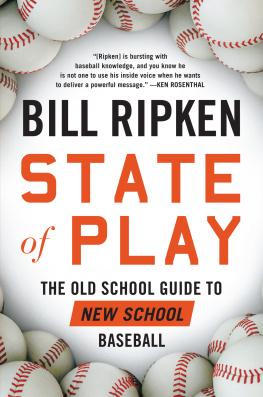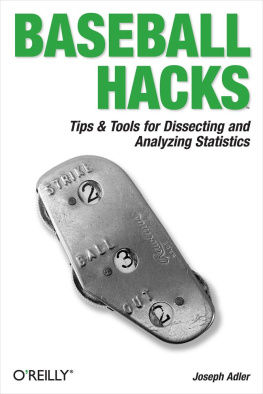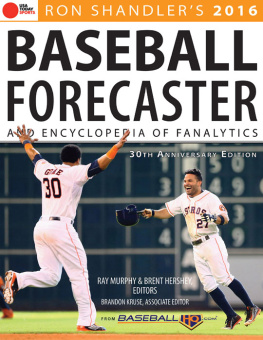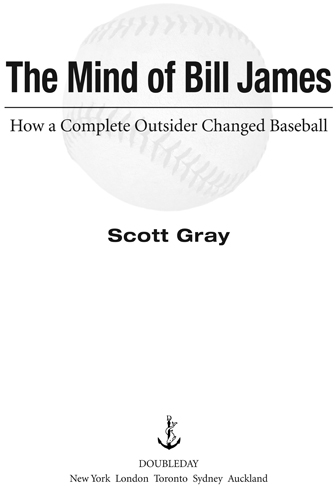thankyouthankyouthankyouthankyouthankyou.
yourewelcomeanequalnumberoftimes. Iwillpassonthethankyoustothosewhodeservethem.
Take nothing on its looks; take everything on evidence. Theres no better rule.
Charles Dickens, Great Expectations
When you have grasped its meaning with your will,
then tenderly your eyes will let it go...
Rainer Maria Rilke
Sabermetrics: from SABR (Society for American Baseball Research). Coined c. 1980 by Bill James, sabermetrician. The search for new knowledge about baseball; the systematic study of baseball questions. (What I do isnt running a computer or checking stats any more than what a scout does is just driving a car and scoring games. Bill James)
Preface
We shouldnt be too confident about the things we think we know. Bill James, The Baseball Book 1992
B ill James first influenced my thinking in 1983, when I read his Baseball Abstract, but my favorite piece of Jamesian wisdom comes at the end of Ben McGraths 2003 New Yorker profile. Trying to explain the connection between his obsession with crime stories and baseball, Bill wrote in an e-mail, I feel a need to be reminded, day in and day out, how easy it is for a fantasy to grab hold of your foot like a rope, and dangle your life upside down while brigands go through your pockets. The essential message of crime books is: Deal with the life youve got. Solve the problems you have, rather than fantasizing about a life without them.
My first Red Sox memories are from October 2, 1978, when the Yankees beat Boston in a one-game division playoff. My love of the Sox was innocent until that afternoon, but the shock of Bucky Dents game-deciding home run introduced me to the fact that life isnt a fantasy and baseball is complicated. My response to heartbreak remains, as Bill phrases it, the horrible compulsion to understand what happened.
Bill grew up rooting for the hapless Kansas City As. In 1977, following college and a stretch in the army during Vietnam, he started self-publishing books of baseball analysis. At first his ideas were as popular with the baseball establishment as a drunken garbage worker at a sorority mixer. But recently the ideas have taken hold in a handful of baseball front offices. With the Red Sox winning the World Series two years after hiring Bill as a consultant, a study of his life, work, and influence seems in order.
Bill points out that people like simple explanations, and love simple explanations that are actually partially true. Theres nothing too simple about the mind of Bill James, but by sifting through his books, talking to his friends and family, and urging him to discuss things like the diversity of lemurs in Madagascar compared to the homogeneity of baseball teams under antitrust exemption, patterns emerge.
This book is about baseball, of course, but its also about psychology, politics, things to do in college instead of studying, and murder. In fact, the godfather of sabermetrics has read hundreds of books about true crime. Whats fascinating about crime stories, Bill says, is the process of moving from the known facts to conclusions about the unknown facts. Its like sabermetrics in that you take a set of known facts and try to infer from them what is unknown. Its the same process but a different set of methods.
Some of the best crime stories are those in which no one knows what happened. Likewise, some of the best biography subjects are the ones you cant figure out. In the movie Chan Is Missing, a man named Jo searches for his missing business partner, Chan Hung. Everyone he talks to has a different idea of who Chan is. Jo realizes, The problem with me is that I believe what I see and hear. If I do that with Chan Hung Ill know nothing, because everything is so contradictory.
I felt that way about my search for Bill James. And, as Jo says about a shadowed picture of Chan Hung, I still cant see him. Another persons view of me is like a mirror, Bill says, but its never a true mirror; theres always something out of proportion. Suppose you looked in the mirror and your nose was three times too big, and your left eye was twice the size of your right eye. This is how I feel about other peoples views of me.
When writing about Bills work, its extremely difficult to keep your beliefs from getting mixed with his. Also, most of his ideas are parts of a larger framework, so abstracting them causes distortion. In that sense, theyre like the game itself. Baseball is an infinite puzzle, Bill says. You can never really understand why teams win and why they lose. You can understand a little bit more, and a little bit more, but you can never exhaust the subject.
He chronicled his efforts to understand in an essential body of baseball books: twelve editions of the Baseball Abstract, the first Historical Baseball Abstract, three editions of the Baseball Book, three Player Ratings Books, The Politics of Glory (republished as Whatever Happened to the Hall of Fame), the Baseball Managers book, and two editions of the New Historical Abstract.
Bill is baseballs pioneering social scientist and most influential analytical writer. I hear from people all the time whose lives were influenced by him, says Rob Neyer, an ESPN.com columnist and one of Bills former assistants. College professors, lawyers, scientists... Bill didnt just teach people how to think about baseball. He taught people how to think about the world.
When I was fifteen I was playing tennis-ball baseball at a friends house when he announced hed found a book by a guy in Kansas who wrote about baseball in a way we wouldnt believe. This was my first encounter with the mind of Bill James, from the 1983 Baseball Abstract introduction:
Hi. My name is Bill James, and Im an eccentric....
The reason that I am eccentric is that I spend all of my time analyzing baseball games. Well, not all of my timeI have a wife to neglectbut most all of my time. I count all kinds of stuff that lots of people are sort of interested in, but nobody in his right mind would actually bother to count. I devise theories to explain how things in baseball are connected to one another....
Like baseball itself, this book is just here for you to enjoy. This is a book for those who abandon themselves to the game, for those to whom the hurried and casual summaries of journalism are a daily affront. It is not for people who already know all about baseball, but for those who want to learn.
I wasnt conscious of it at the time, but that appealed to me as an approach to life as much as a way to look at baseball.
Twenty years later I was working as a copyediting supervisor at a New York book publisher when a Rob Neyer manuscript came in, co-authored with Bill James himself. I had worked with Rob on his Baseball Lineups book, and I was jazzed to interact with his former bossmostly out of admiration, but also out of perverse curiosity.
Back in 1987, at my first publishing job, my boss saw me reading an Abstract and informed me that the author was difficult. My next gig happened to be with the publisher of the Abstracts, Ballantine Books. When I suggested to colleagues that they were lucky to work with Bill James, the eye rolls were deafening. Finally, at the Neyer/James publisher, word was that Mr. James accepts no copyediting.





![Baseball Info Solutions. - The Bill James handbook 2014: [the complete up-to-date statistics on every major league player, team and manager through last season]](/uploads/posts/book/187296/thumbs/baseball-info-solutions-the-bill-james-handbook.jpg)



